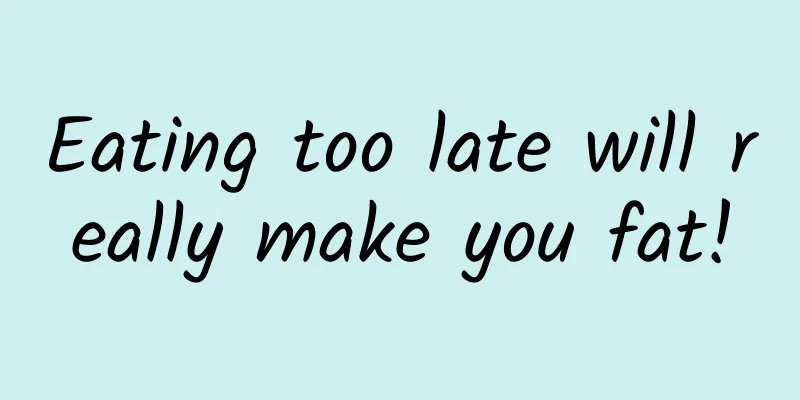Eating too late will really make you fat!

|
We know that "eating too late is bad for your health", but what exactly is bad about it? Is there really any difference between eating the same food earlier and later? In order to figure out what happens to the body when we eat at different times, scientists conducted a series of studies and experiments, and found that: it is indeed different. Image source: pixabay Previous studies have shown that controlling eating during active periods can consume more calories without changing intake. Researchers at Harvard University's Brigham and Women's Hospital published a study on the link between delayed meal times and obesity in the authoritative journal Cell Metabolism. Through a randomized crossover trial, they found that delayed meal times increase hunger, change the secretion of appetite-regulating hormones, reduce daytime energy expenditure, and change the expression of genes that regulate fat production and decomposition. To put it simply, eating late will cause you to gain weight from multiple angles, levels, and all aspects. In order to simultaneously determine the impact of postponing meal times on energy intake control, energy expenditure and the molecular regulatory mechanisms of adipose tissue metabolism, the experiment strictly controlled variables such as food intake time, quantity and type (that is, total calorie intake and dietary composition), physical activity, sleep and light. The study included 16 overweight or obese participants with an average age of 37.3 years and an average BMI of 28.7, of which 5 participants were female. In the 2-3 weeks before the start of the trial, all participants maintained a fixed sleep and wake cycle and received a diet calculated and prepared by the researchers at regular intervals within 3 days before the start of the trial. The subjects' food, physical activity, and schedule were strictly controlled to ensure that all variables were consistent except for "eating time". Participants were randomly assigned to either an earlier meal schedule or a later meal schedule with a delay of 250 minutes (approximately 4 hours). In the earlier eating schedule (B), participants ate 1 hour (B), 5 hours 10 minutes (L), and 9 hours 20 minutes (D) after waking up, and in the later eating schedule (C), participants ate 5 hours 10 minutes (L), 9 hours 20 minutes (D), and 13 hours 30 minutes (S) after waking up. To provide a comparison with themselves, both groups resumed their previous eating habits for the next 3-12 weeks, followed by a washout period, and then followed the opposite eating schedule. Primary outcomes were measured on study days 3 and 6 and included waking energy expenditure, subjective hunger, appetite, and 24-hour secretion of core body temperature (CBT), leptin, and ghrelin. On the fifth day of the study, fat biopsies were taken from both groups after a 15-hour fast to analyze gene expression. The results were striking: 01 Eating late will increase your appetite the next day The researchers found that the hormone that controls hunger (ghrelin) in the stomachs of subjects who ate late increased significantly, while the hormone that makes people feel full (leptin) decreased, which greatly increased the feeling of hunger, even by 34% during the day. I don’t know if you have ever had this experience. If you have a midnight snack before going to bed the day before, you will feel very hungry when you wake up the next day, and your stomach will be particularly empty. This is not your illusion, it may be related to changes in appetite-related hormones. Not only were the subjects hungry, they also generally reported that they had a stronger desire for high-carb, meaty, and heavy-tasting foods. Who can stand this? ! 02 Eating late will reduce your metabolism the next day The core body temperature of the subjects who ate late was significantly lower in the subsequent 24 hours. This shows that the body used less calories to maintain body temperature and the basal metabolism was downregulated! According to monitoring, energy consumption has been reduced by about 5%, about 41 kcal to 68.8 kcal, which is equivalent to the calories consumed by walking for 15 minutes. Do you think it is a loss? ! 03 Eating late makes it easier for fat to accumulate. The researchers extracted the subjects' subcutaneous fat tissue and observed changes at the molecular level. They found that when eating late, the expression of genes related to lipid decomposition decreased, while the expression of genes related to lipid synthesis increased. (The research team collected tissue biopsies of subcutaneous white adipose tissue in the early and late feeding regimens and performed differential expression and pathway enrichment analysis. Late feeding led to downregulation of the expression of some genes responsible for lipid breakdown, such as PLD6, DECR1, and ASAH1. In contrast, genes regulating lipid synthesis, such as GPAM, ACLY, AACS, and CERK, continued to be upregulated.) In simple terms, fat decomposition decreases and synthesis increases, so it only goes in but not out, and all of it becomes fat that accumulates on your body... What's even more heartbreaking is that the "late eating" plan in the experiment is still strictly implemented according to the 16:8 intermittent fasting method. But if you not only eat late, but also have a variety of snacks, cola, milk tea, fried chicken, and a snack from time to time, your body's metabolic changes may be more obvious. Why does just having a midnight snack or eating dinner a little late have so many bad effects on the body? Over the past two million years, humans have evolved a built-in biological clock in order to adapt to the light and dark cycles of the earth. This "clock" is encoded in our genes and exists in various organs, tissues, and cells, constantly adjusting our endocrine system and metabolism. Irregular work and rest schedules and meal times are like a wrong program code that interferes with our entire body program. In the era of working from 9 to 5, people usually finish dinner before 6 o'clock and go to bed at 10 o'clock. In the fast-paced modern society, various overtime, night shifts, social events, etc., make the question of "when to eat" not up to you. Many people's eating time is postponed, and dinner is pushed to 7 or 8 o'clock, and they will have a midnight snack when they are hungry after staying up late. It is really difficult for you not to eat at night, so what can you do? We can try to push the meal time as far forward as possible, and it is best to eat the last meal 4 hours before going to bed, leaving enough rest time for the body to do what it should do at night. As for midnight snacks, it’s okay to have one or two once in a while, but if it becomes a regular occurrence, your body will cry. Main references: [1]Hepler C, Weidemann BJ, Waldeck NJ, Marcheva B, Cedernaes J, Thorne AK, Kobayashi Y, Nozawa R, Newman MV, Gao P, Shao M, Ramsey KM, Gupta RK, Bass J. Time-restricted feeding mitigates obesity through adipocyte thermogenesis. Science. 2022 Oct 21;378(6617):276-284. doi: 10.1126/science.abl8007. Epub 2022 Oct 20. PMID: 36264811. [2]Vujović N, Piron MJ, Qian J, Chellappa SL, Nedeltcheva A, Barr D, Heng SW, Kerlin K, Srivastav S, Wang W, Shoji B, Garaulet M, Brady MJ, Scheer FAJL. Late isocaloric eating increases hunger, decreases energy expenditure, and modifies metabolic pathways in adults with overweight and obesity. Cell Metab. 2022 Oct 4;34(10):1486-1498.e7. doi: 10.1016/j.cmet.2022.09.07. PMID: 36198293. [3] Hill JO, Wyatt HR, Peters JC. The Importance of Energy Balance. Eur Endocrinol. 2013;9(2):111-115. doi:10.17925/EE.2013.09.02.111 [4] Kim JY. Optimal Diet Strategies for Weight Loss and Weight Loss Maintenance. J Obes Metab Syndr. 2021;30(1):20-31. doi:10.7570/jomes20065 [5] Romieu I, Dossus L, Barquera S, et al. Energy balance and obesity: what are the main drivers?. Cancer Causes Control. 2017;28(3):247-258. doi:10.1007/s10552-017-0869-z [6] Garaulet M, Gómez-Abellán P, Alburquerque-Béjar JJ, Lee YC, Ordovás JM, Scheer FA. Timing of food intake predicts weight loss effectiveness [published correction appears in Int J Obes (Lond). 2013 Apr;37(4):624]. Int J Obes (Lond). 2013;37(4):604-611. doi:10.1038/ijo.2012.229 The article is produced by Science Popularization China-Starry Sky Project (Creation and Cultivation). Please indicate the source when reprinting. Author: Shanxi Medical University Health Science Communication Team Reviewer: Chen Ran, Associate Researcher and Senior Engineer, COFCO Nutrition and Health Research Institute |
<<: Can drinking tea and coffee help you lose weight and be healthy?
>>: Choose the right milk and drink the right milk - A scientific guide to drinking milk
Recommend
What is the normal number of follicles?
The follicle is a substance secreted by the femal...
Medium-length bangs
Women generally have long hair, and bangs play a ...
Jelly-like leucorrhea during ovulation
Secretion is a milky white, stretchy, gel-like su...
What are the symptoms of intrauterine infection during pregnancy
Intrauterine infection during pregnancy is a seri...
What is the reason why women's period is late?
Menstruation is a very important physical reactio...
Can I get pregnant during moxibustion?
Pregnancy is actually a relatively complicated pr...
Chest pain after sex
In fact, in real life, many female friends someti...
What is the relationship between Ming Yefeng and Baili Hongyi in the Ancient Covenant? What is Ming Yefeng's ending?
Recently, the TV series The Ancient Covenant in C...
Itchy nipples after pregnancy
Many women find that their nipples feel itchy dur...
Is HPV infection serious?
Many women are very anxious when they find out th...
What can't girls eat during their period?
Women need to be careful at all times when they h...
What to do if your pubic hair is itchy
In our daily lives, health has become a hot topic...
Symptoms of urethritis in women
If a woman is affected by urethritis, she must ac...
Can ovarian cysts cause ectopic pregnancy?
There are many patients with ovarian cysts in our...
How to induce menstruation on the same day
Menstruation is a physiological response that occ...









